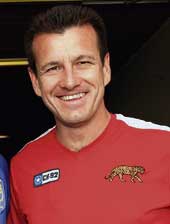 |
Rio de Janeiro: Former Brazil midfielder and captain Dunga was surprisingly named as the country’s new national team coach on Monday.
The 42-year-old, with no previous coaching experience, replaced Carlos Alberto Parreira, who resigned last Wednesday following Brazil’s disappointing performance at the World Cup. The five-time champions were surprisingly knocked out in the quarter-finals by France after beginning the tournament in Germany as hot favourites.
The Brazilian Football Confederation (CBF) said on its official website that Dunga agreed terms after a two-hour meeting with its president Ricardo Teixeira.
The CBF did not say how long Dunga would be in charge but he said his appointment was part of a restructuring of the national team set-up that had the 2010 and 2014 World Cups as targets.
The midfielder, famous for his fighting spirit, captained the Brazil team that won the 1994 World Cup and wore the armband again four years later when they were runners-up to France. He was also in the 1990 team.
“I want to bring the same determination I had as a player,” Dunga told the CBF’s website.
“Motivation and will to win are fundamental for anyone who wants to wear the shirt of the Brazilian national team.”
The favourites to replace Parreira had been ex-Real Madrid coach Vanderlei Luxemburgo and former Peru coach Paulo Autuori.
First-choice Luiz Felipe Scolari, who led Brazil to the 2002 world title, preferred to stay with Portugal until 2008.
Dunga’s first game in charge will be a friendly against Norway in Oslo on August 16. Brazil are not due to play any competitive games until next year’s Copa America in Venezuela.
Dunga faces a tough rebuilding job and one of his first decisions will be the international future of forward Ronaldo, who looked out of sorts at the World Cup.
It is believed that Brazil took a leaf out of Germany’s book by putting a man with no previous coaching experience in charge of their national side.
Juergen Klinsmann’s success at leading Germany to third place in the World Cup, two years after a humiliating first-round exit in Euro 2004, has inspired the five-time world champions to put the untested Dunga into the hot seat. It is Brazil’s second such experiment in recent times and Dunga will be hoping to fare better than Paulo Roberto Falcao who lasted one unhappy year in 1990-91.
Parreira’s reliance on his ageing group effectively turned the national team into a closed shop in the last 18 months, barring the way to the country’s up-and-coming talent.
Many of the players who looked promising one year ago have since departed Brazil, disappearing into relative obscurity with middle-ranking European clubs.
Dunga experienced both the joy and pain of representing the world’s most successful international team during his playing days. In 1990, he was made the scapegoat after Brazil crashed out of the World Cup in Italy in the second round.
It became known as the “Dunga Era” after commentators accused Brazil of replacing their traditional flair with the hard-tackling approach symbolised by Dunga.
ALL ABOUT THE MAN IN THE HOT SEAT
- Real name Carlos Caetano Bledorn Verri. His nickname is the Portuguese translation of the Dopey character in the film Snow White and the Seven Dwarfs.
- He was made the scapegoat after Brazil were knocked out of the 1990 World Cup in the second round by Argentina. It was known as the ‘Dunga Era’, supposedly because Brazil replaced traditional flair with the hard-tackling game he symbolised.
- Four years later, he returned in style to captain the team that won Brazil’s fourth World Cup.
- Dunga also led Brazil at his third World Cup in 1998 but this time the adventure ended in disappointment as they lost 0-3 to France in the final, his last international. By this time, however, Dunga was recognised as a tackler, distributor of the ball and inspirational leader.
- He returned to Internacional in 1999, the club where he started his career, and despite being dropped several times by coach Emerson Leao, scored the goal that saved them from relegation.
- Dunga also played in the Brazil team that won the Copa America in 1999.
- His club career also took him to Italy, Germany and Japan.










